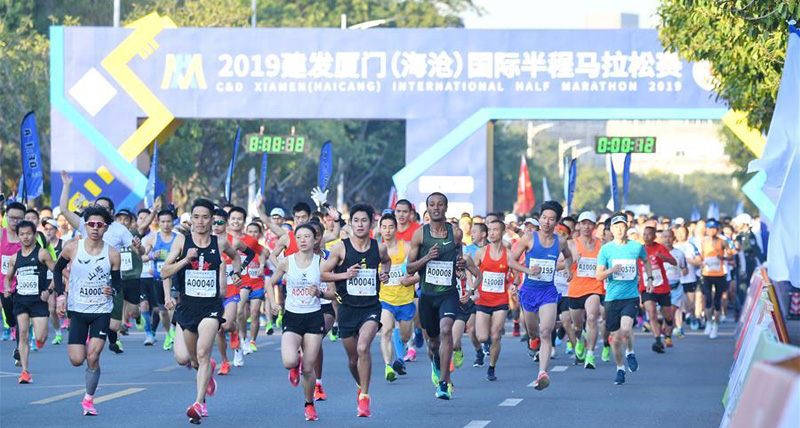China remains attractive to investors as business environment improves
By Lin Lili, Wu Qiuyu| People's Daily| Updated: Sep 25, 2019
China's efforts to accelerate the building of a top-ranking business environment that features internationalization, the rule of law and convenience have yielded many more fruits, significantly benefiting domestic and overseas enterprises, while laying a solid foundation for high-quality economic development.
A technology company based in northwest China's Ningxia Hui Autonomous Region is a beneficiary of the improved business environment. This year, the company enjoys a tax reduction of about one million, according to Li Junhua, general manager of the company.
The money could be used to build a digital factory, hire a high caliber of talents or shorten the research and development cycle by 30 percent, Li disclosed.
Thomas Henningsson, sales director of Vorwerk China, said the household appliance company has started the extension project of its plant in Qingpu district, Shanghai, as it aims to establish a foothold in China.
"At the First China International Import Expo (CIIE), we fully displayed our robot technology then. This time, we have already prepared new exhibits prior to the 100-day countdown to the second CIIE," he said.
In the Doing Business 2019, a report released by the World Bank, China ranked 46th globally for ease of doing business, becoming one of the economies realizing the most significant improvement in terms of business environment.
The country was among the top 20 most-innovative economies, ranking 17th in the Global Innovation Index 2018 released by the World Intellectual Property Organization.
Through simplifying approval procedures and expediting the use of the internet in government affairs, the country has improved the efficiency for establishing a business, application and installation for water and electricity facilities and real estate registration by more than 50 percent.
Improvement in the quality and efficiency of government services has greatly benefited both domestic and foreign business owners in China. In the first half of this year, over 19,400 new companies were set up on an average day.
Cui Liang, manager of an agriculture technology in Beijing who applied for a business license from Chaoyang district government days earlier, said he submitted his application for a business license, official seal and invoice at 2:30 p.m., and received them all at 5: 15 p.m. on the same day. "The efficiency is unbelievably high," he exclaimed.
Uzbek entrepreneur Erik had the same experience as Cui did while he was setting up an e-commerce company in Shanghai not long ago. "I used to establish companies in other countries, but just know that it's so convenient to register a company and pay relevant taxes in China."
China has made great efforts to ensure fairer competition and enhance the rule of law in the Chinese market.
The country adopted its Foreign Investment Law, ensuring that companies from both home and abroad are treated as equals and compete on a level playing field. It also completed revision of its first e-commerce law and a regulation on patent agencies. Besides, the Supreme People's Court of China opened its Intellectual Property Court to strengthen protection of intellectual property rights (IPR).
Zhu Honglan, vice president at A.O. Smith (China) Water Heater Co. Ltd., said when a company in Zhongshan, south China's Guangdong province, infringed on Smith's products, it was held to account by a local court and compensated Smith according to law.
"I really feel that the Chinese government takes an impartial position on safeguarding legitimate rights and interests of foreign companies," Zhu add.
"I can see that China is strengthening IPR protection," said Lu Zhou, deputy general manager of Feitian Technologies, a leading global provider of cyber security products and solutions in China.
He said the technical investigation department under the Intellectual Property Court in Beijing is a good practice to guarantee imparity of trials.
China has taken a raft of measures to reduce business burdens. The government has tightened its belt to allow more benefits to the enterprises.
In January 2019, the general-benefit tax cut policies for small and micro businesses was put into effect. In April, the country cut the rates of value added tax (VAT) in manufacturing. In May, it reduced the social insurance contribution rates, and in July, it lowered fees for real estate registration.
"Thanks to the wider range and more extensive reduction of taxes and fees under the VAT reform, this year, my company has been exempted from a tax burden of more than 4 million yuan," said Du Qingshen, president of Hebei Yong Yang Special Steel Group Co., Ltd.
Both domestic and foreign companies have benefited from cuts in taxes and fees, said Jiang Ying, deputy CEO of Deloitte China, adding that overseas investors would be granted tax deferral for profit reinvestment in China, the most attractive preferential tax policies for foreign companies.
China has also rolled out concrete measures to further open up its market, thus attracting more foreign investors. The country has shortened the negative list for foreign investment market access. In 2018, China removed foreign equity caps on manufacturing of special-purpose vehicles and new-energy vehicles.
From applying for a business certificate, to signing an agreement and breaking grounding at the beginning of the year, it took only five months for US electric carmaker Tesla to build its gigafactory in Shanghai.
"I love Shanghai," said Elon Musk, CEO of Tesla, at the groundbreaking ceremony of its super factory.
China's broad market and improving business environment are attracting more foreign investment, said Zhao Ping, director of the international trade research department under the Academy of China Council for the Promotion of International Trade.
In the first half of 2019, the country's actual use of foreign investment rose by 7.2 percent year on year, with over 20,000 foreign invested enterprises established.
Improvement of the business environment is an on-going process. China will continue to foster a world-class business environment for high-quality economic development.
The country will deepen reforms in the business sector, ensure a level-playing field for all market players, and improve the property rights system, said He Xin, president of China Society of Market Supervision, adding that as China's investment environment is all set to get better and better, all market entities will enjoy sound development conditions and broad prospects.



 play
play